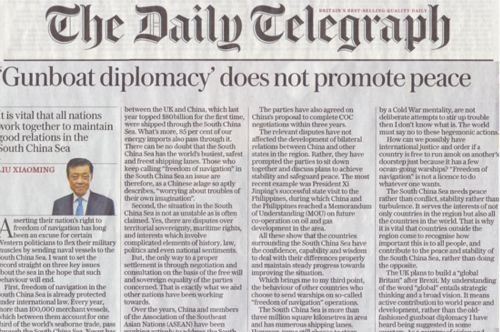
On 20 March 2019, the Daily Telegraph and its website published a signed article by Ambassador Liu Xiaoming entitled “‘Gunboat diplomacy’ does not promote peace”. The full text is as follows:文章源自英文巴士-https://www.en84.com/6822.html
文章源自英文巴士-https://www.en84.com/6822.html
2019年3月20日,英国主流大报《每日电讯报》纸质版和网络版刊登刘晓明大使署名文章《“炮舰外交”损害和平》。全文如下:文章源自英文巴士-https://www.en84.com/6822.html
文章源自英文巴士-https://www.en84.com/6822.html
‘Gunboat Diplomacy’ Does Not Promote Peace文章源自英文巴士-https://www.en84.com/6822.html
“炮舰外交”损害和平文章源自英文巴士-https://www.en84.com/6822.html
文章源自英文巴士-https://www.en84.com/6822.html
Asserting their nation’s right to freedom of navigation has long been an excuse for certain Western politicians to flex their military muscles by sending naval vessels to the South China Sea. I want to set the record straight on three key issues about the sea in the hope that such behaviour will end.文章源自英文巴士-https://www.en84.com/6822.html
文章源自英文巴士-https://www.en84.com/6822.html
一个时期以来,总有一些西方政客炒作所谓南海“航行自由”问题,然后便以此为借口,鼓吹要派军舰到南海耀武扬威。我想就此强调三点,希望此类言行在南海不再发生。文章源自英文巴士-https://www.en84.com/6822.html
First, freedom of navigation in the South China Sea is already protected under international law. Every year, more than 100,000 merchant vessels, which between them account for one third of the world’s seaborne trade, pass through the South China Sea. Never has any single one of them been interrupted or impeded. For China, the world’s largest trader in goods in 2018 (with trade valuing $4.62 trillion) and a key trading partner for more than 130 countries and regions in the world, the South China Sea is the route taken by more than 60 per cent of its seaborne trade.
The majority of the goods traded between the UK and China, which last year topped $80 billion for the first time, were shipped through the South China Sea. What’s more, 85 per cent of our energy imports also pass through it. There can be no doubt that the South China Sea has the world’s busiest, safest and freest shipping lanes. Those who keep calling “freedom of navigation” in the South China Sea an issue are therefore, as a Chinese adage so aptly describes, “worrying about troubles of their own imagination”.
第一,各国依据国际法在南海享有航行自由。全球三分之一海上贸易航经南海,每年超过10万艘商船顺利穿梭其间,从没有哪艘船航行遇到过干扰或阻碍。2018年中国蝉联世界第一大货物贸易国,进出口总额达4.62万亿美元,是包括南海沿岸各国在内的全球130多个国家和地区的主要贸易伙伴,其中60%以上的海上贸易取道南海。中英货物贸易去年首次突破800亿美元,其中大部分航经南海。此外,中国85%的能源进口都从南海经过。可以说,南海是世界上最繁忙、最安全、最自由的航道。对那些炒作南海“航行自由”的人,用一句中国古话来形容,就是“天下本无事,庸人自扰之”。
Second, the situation in the South China Sea is not as unstable as is often claimed. Yes, there are disputes over territorial sovereignty, maritime rights, and interests which involve complicated elements of history, law, politics and even national sentiments.
But, the only way to a proper settlement is through negotiation and consultation on the basis of the free will and sovereign equality of the parties concerned. That is exactly what we and other nations have been working towards.
Over the years, China and members of the Association of the Southeast Asian Nations (ASEAN) have been working actively to address the South China Sea issue. Together we signed the Declaration on the Conduct of Parties in the South China Sea (DOC) in 2002. Since then we have conducted vigorous negotiations on the Code of Conduct in the South China Sea (COC) which resulted in a single draft text of the COC, the first reading of which will have been completed by the end of this year.
The parties have also agreed on China’s proposal to complete COC negotiations within three years.
The relevant disputes have not affected the development of bilateral relations between China and other states in the region. Rather, they have prompted the parties to sit down together and discuss plans to achieve stability and safeguard peace. The most recent example was President Xi Jinping’s successful state visit to the Philippines, during which China and the Philippines reached a Memorandum of Understanding (MOU) on future co-operation on oil and gas development in the area.
All these show that the countries surrounding the South China Sea have the confidence, capability and wisdom to deal with their differences properly and maintain steady progress towards improving the situation.
第二,所谓南海局势不稳更不是事实。由于历史原因,南海地区存在一些领土主权、海洋权益争议,涉及历史、法律、政治甚至民族感情等诸多复杂因素。怎么解决?基于当事方自主意愿和主权平等的谈判协商是唯一出路,这也正是中国与相关国家一直以来的共同努力方向。多年来,中国与东盟国家一直为此付出积极努力,并于2002年共同签署《南海各方行为宣言》,目前正积极推进“南海行为准则”磋商,形成了“准则单一磋商文本草案”,将于今年年内完成草案第一轮审读。各方还一致同意中国提出三年内完成“准则”磋商的愿景。南海有关争议不仅没有影响中国与沿岸国双边关系发展,而且促使大家坐下来,共商稳定方案,共谋和平大计。不久前,习近平主席成功对菲律宾进行国事访问,中菲双方就南海开发合作达成谅解备忘录。这些都充分说明,地区国家有信心、有能力、有智慧妥善处理好分歧,共同维护好南海局势稳中向好的势头。
Which brings me to my third point, the behaviour of other countries who choose to send warships on so-called “freedom of navigation” operations.
The South China Sea is more than three million square kilometres in area and has numerous shipping lanes. However, some still choose to steer their navy warships close to the waters adjacent to China’s islands and reefs. Some even illegally enter China’s territorial waters.
These moves flagrantly infringe upon China’s sovereignty and maritime rights, deliberately drive a wedge between China and its neighbours, and exacerbate regional tensions. If these acts of gunboat diplomacy, motivated by a Cold War mentality, are not deliberate attempts to stir up trouble then I don’t know what is. The world must say no to these hegemonic actions.
How can we possibly have international justice and order if a country is free to run amok on another’s doorstep just because it has a few ocean-going warships? “Freedom of navigation” is not a licence to do whatever one wants.
第三,个别域外国家执意打着“航行自由”旗号派军舰去南海,放着300多万平方公里的广阔水域和畅通的国际航道不走,非要抵近中国岛礁海域,甚至非法闯入中国领海。这些行径公然侵犯中国主权和海洋权益,蓄意挑拨中国与地区国家关系,刻意制造地区紧张局势,完全是赤裸裸的“冷战思维”和“炮舰外交”!如果一国凭借自己有几艘远洋军舰,就跑到别国“家门口”横冲直撞,那么国际公理何在?!国际秩序何在?!这根本不是什么“航行自由”,而是“横行自由”!对这种霸权主义行径,我们必须坚决说“不”!
The South China Sea needs peace rather than conflict, stability rather than turbulence. It serves the interests of not only countries in the region but also all the countries in the world. That is why it is vital that countries outside the region come to recognise how important this is to all people, and contribute to the peace and stability of the South China Sea, rather than doing the opposite.
南海要和平不要冲突,要稳定不要动荡。这不仅符合地区国家利益,也符合世界各国的利益。那些域外国家应当看清大势,顺应民心,多做有利于南海和平稳定的事,而非相反。
The UK plans to build a “global Britain” after Brexit. My understanding of the word “global” entails strategic thinking and a broad vision. It means active contribution to world peace and development, rather than the old-fashioned gunboat diplomacy I have heard being suggested in some quarters. As a country of vision and wisdom, the UK should be able to make a choice that can stand the test of time.
在脱欧大背景下,英国正致力打造“全球化英国”。何谓“全球化”?我的理解就是要有大格局、大视野,就是能为世界和平与发展做出积极贡献,而不是某些人鼓吹的过时的“炮舰外交”。英国是富有远见和智慧的国家,一定能做出经得起历史考验的选择。

